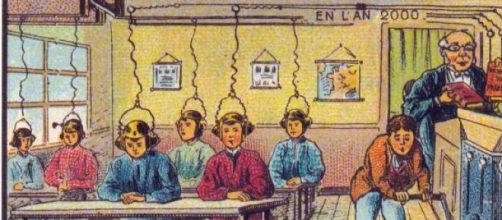My first experience of e-learning was loading French is Fun on to my ZX Spectrum in 1985. I didn't load it a second time. It was a basic (probably literally, as the Spectrum used the BASIC programming language) app that would show you a badly drawn image of a tree and expect you to type in un arbre to score points. So where does thirty years of progress get us?
E-learning proper, excluding my Spectrum days and kicking in around the turn of the millenium, was a vague nebulous concept.
It was something that schools and colleges knew they needed to get in on, but those at the top had no idea of what 'getting in' actually meant. The solution was to create e-learning 'Champions', a few hours each week allocated to a member of staff who loved gadgets. From this one short sighted decision stems all the current failures with e-learning.
Take away the 'e' and what are you left with?
Learning. What the hell does this mean to a tutor? Tutors don't do the learning in the classroom, they do the teaching. Ask a tutor what e-teaching means and they come back with ideas about transforming what they do in the physical classroom in to cyberspace. Ask them what e-learning means and you get a blank expression and mumbling of Moodle and the interactive whiteboard that they might use if only the special pen hadn't been nicked. Many tutors have no idea what's expected of them.
I signed up for a brace of their courses this autumn.
They turned out to be a mixed bag. First the good stuff: the design is consistent and the sign up procedure is pretty painless. The courses are mostly well structured and written. Likewise, the video content is well filmed and relevant. Some courses even have a charismatic lead tutor who works more as your guide and host. However, other tutors look to uncomfortable on screen and some are allowed to babble on. Further marks are deducted for videos that are simply PowerPoints (not even with narration) - just give us the pptx file, or embed it from SlideShare! Each week ends with a multiple choice quiz, where there are far too many mouse clicks required to get to the banal stock responses to your answers.
A key aspect to the FutureLearn courses is the use of comments and social media to engage learners and get them to self support each other. I'm not a fan of this approach. If I'm on a course I want to learn from someone who is an expert in the subject, not get the opinions of somebody at my own novice level. I wouldn't trust anything I had to say. I like to challenge and question; in forums where the other contributors are all happy clappy ('Thanx, Dave. UR wonderful. :-). X') I usually end up feeling like a troll.
A problem with e-learning is the desire of educators to keep control of things. For the learner this can be frustrating; at the end of a week's module you can be chomping at the bit to continue, but the next module is not scheduled to go live for several more days. It's like having a book where the chapters are drip fed. The whole point of distance learning is it allows a student to set their own pace.
So is FutureLearn a success? Yes. I got through five courses and decided it was worth stumping up twenty-five quid for certificates for two of them. I can say that I have learned something and kept the old grey matter stimulated. I've signed up for two more courses in the new year. But at the back of my head I have a nagging that, for all the interface design and multimedia, there's nothing new here. Nothing groundbreaking.
Reviewing French is Fun back in 1985, Crash magazine refer to it as a 'teaching aid'. Despite huge investments over the decades, this still seems to be the best description of e-learning. It excels at helping the learner to understand topics better, it's the greatest library imaginable, but e-learning as a tutor still fails to grab the attention of the class.

